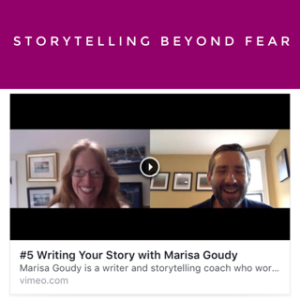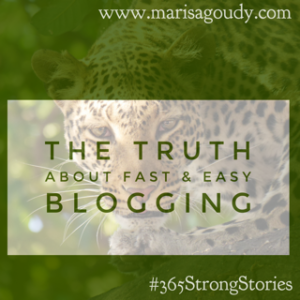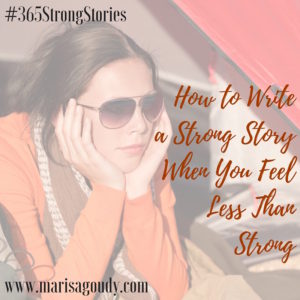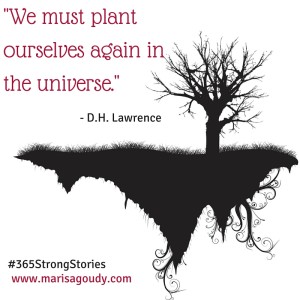
BLOG
On Being A Transformation Professional During The Season Of Selling Stuff
It’s hard be someone who offers creative transformation services when the emphasis is all on STUFF.
And no stretch of time is tougher for us evolutionary service providers than all these themed shopping days that hang about Thanksgiving like so many tantalizing, calorie-packed desserts.
Our sky looks different from the warehouse scaffolding of box stores and the online giants. We offer stillness and introspection. We offer healing that may sting before it soothes. These time-honored paths to growth and lasting peace seem absurd in our doorbuster, free shipping, instant gratification holiday climate. There must be a lotion or a pill or a fuzzy slipper set that can do the same thing, right? Sigh. Of course not. But sometimes it seems like we’re the only ones who know that.
First, remember what it means to be in the transformation business
This weekend, I went to a "Small Business Saturday" event with a group of local women selling a number of products. It was a lovely little gathering. I came home with some budget-stretching makeup, super cute leggings, and a huge case of "not enoughness." Everything seemed so fun and effortless and it all smelled delightful. Selling clothing and essential oils seemed so much simpler than sweating over sentences for a living.
On the walk home, doubt and Christmas budget worries started to take over. But then, a friend reminded me, “They're selling something, not creating anything. That’s not what you do, is it?”
Well, sure, selling is part of what every small business person has to do, but when you’re a coach, a therapist, a healer, or anyone else who offers time in support of another’s evolution... selling comes second. And it’s probably not the sort of thing that people are going for during the busiest shopping weekend of the year.
Time for a transformational reframe of all these "special deals"
I just came across the phrase "self-evolved small business." This feels like balm to my tired, over-extended entrepreneur's soul right now.
All of us could use the reminder that we've all done something tremendous in hanging out the proverbial shingle and essentially creating something from nothing more than our passionate, creative caring hearts.
Creating something, offering something that comes from the core of who you are and standing in your truth... that's a truly special deal.
So, in the midst of all the consumerism and the holiday's special offers, I just want to invite you to stand in what you've created this year, stand in the space that you have created for so many people.
Breathe into enoughness. Breathe into your evolution. Breathe into the evolutionary spaces you create for your clients. Just breathe.
What's your alternative to a holiday sale?
When you realize it's ok to sit out the late November salesy blitz, it's not an excuse to opt out of marketing your good work. Rather than creating reactionary social media posts about a sale you just thought up, use this time to plan how you'll promote and sell your service or other offering when the time is right.
Rebecca helped me see something else during our conversation this weekend… While we don’t sell stuff that’s going to look nice under the tree, we DO offer something that will help our colleagues transform their 2017.
If you’re a therapist, this is a great time to join our community, The Practice of Being Seen. And, since the one truly good thing about all these themed buying days is #GivingTuesday, we’re donating a portion of the community enrollment fee to the ACLU and the Southern Poverty Law Center when you join today. Learn more & join us
Storytelling Beyond Fear
 What scares you most about telling your story?- you have nothing to say
- you're afraid what people might say
- you're afraid that people won't say anything at all
What scares you most about telling your story?- you have nothing to say
- you're afraid what people might say
- you're afraid that people won't say anything at all
I had a chance to talk through all of these story-blocking fears with John Harrison for his True Calling Project.
In this conversation we covered how our stories are the foundation of everything we do - as individuals, as professionals, as marketers. And I dared to tell John's viewers the truth:
Storytelling can be scary and it can take a while.
When you face down those fears with a dedicated writing process, the magic happens.
#5 Telling Your Story with Marisa Goudy from John Harrison on Vimeo.
The Truth About Fast and Easy Blogging
 “You can ask me anything!”
What a bold and crazy statement.
“You can ask me anything!”
What a bold and crazy statement.
As it happens, in the right environment, it feels safe and smart to do just that.
This week, I am thrilled to be the featured expert over at Agnes Wainman’s Blissful Practice, a Facebook group for clinicians who want to change the conversation around what it means to have a private practice. The group hit 700 members, so if you’re a therapist looking to find a blissful, vibrant community, ask to join!
It started with “what is this whole storytelling thing, really?
I’m grateful for this chance to dive right into questions that include “what is this whole storytelling thing, really?” to how to honor professional boundaries while telling a personal story that tells clients “I get you.”
Then I got a question that kind of freaked me out
A therapist who coaches her colleagues on building their practices wanted some tips on how to streamline her blogging practice. She was writing a weekly post in an hour and wanted to shave some time off the process.
I needed to be sure that my response honored her approach and also stayed true to my message and my experience. After pounding the delete key 1,245 times I replied:
I'd say an hour from start to finish is pretty remarkable.
I must admit I'm not the best resource for "quick and easy blogging tips." I see blogging and writing as part of the bigger picture... developing your ideas on the screen is part of becoming the clinician, businessperson, and individual you want to be. There's no shortcut for that. The intention is that the process is every bit as rewarding as the outcome.
(Just one woman's opinion since years of "just create content!" blogging left me feeling depleted, invisible, and unsatisfied.)
Was I concerned that someone in the business of boosting business would laugh at my answer? “Ha! No writing shortcuts? That’s nice for some people, Miss Writer Girl” Oh, yes.
I was worried that my advice would seem lovely but simply impractical for busy professionals who are already trying to do so much.
Writing & blogging bliss is found in the midst of the process
But then this I got this response from this awesome therapist/coach/writer who happens to be short on time. Her name is Allison Puryear and she's the woman behind Abundance Practice Building
THANK YOU! Seriously. I think I internalized the message that I should be churning them out. I can write some crap or "quick tips" pretty fast, I bet. I feel like more of a storyteller in my blogs than an advice giver. I decided last year that I'd rather write one valuable blog a week & take the SEO hit by not posting more frequently. I don't want to dilute my message with filler. Now I feel like I have "permission" to enjoy my process instead of feeling like I should be faster. Thanks!
YES! There is power in enjoying the writing process... even if it takes a little while. And our digital world will be a little richer now that Allison is giving her inner storyteller the chance to take over the keyboard.
What about you? Is it time to move away from churning out content and embrace storytelling that connects you with yourself, your stories, and your reader?
How to Write a Strong Story When You Feel Less Than Strong
 Making blogging, newsletter, and other content marketing details when you're sick, stressed, or sad... It's one of the toughest parts of running a practice or a small business because, let's be honest, you're pretty much always writing this week's material just days or hours before it goes live.
What happens when life or your mood gets in the way of getting yourself in front of your audience?
Making blogging, newsletter, and other content marketing details when you're sick, stressed, or sad... It's one of the toughest parts of running a practice or a small business because, let's be honest, you're pretty much always writing this week's material just days or hours before it goes live.
What happens when life or your mood gets in the way of getting yourself in front of your audience?
First, ask yourself: MUST I get this written today?
That depends on several factors, so go deeper and ask yourself a few more questions.
Are these self-imposed deadlines or did you promise a guest post or something that is going to print?
When another site or publication is waiting on you, writing becomes a job you simply need to do. I suggest you set a time, sit down in that chair, and put words on the page. Call in a friend or an editor to help you bring it up to your "I feel fabulous!" standards if you're having trouble connecting your ideas and connecting to readers.
Breaking a promise to yourself is no easier than letting down a colleague or an editor, but it may have fewer longterm consequences. Can you forgive yourself for posting on a Friday instead of a Thursday? If you're not in the middle of a big launch cycle, can you skip on the newsletter this week?
When you set publication schedules for yourself, be clear about your own boundaries. Be realistic and be compassionate with yourself.
In my case, a #365project offers ZERO wiggle room. Daily means daily and skipping a day seems like a really big problem. The pay off on showing up every day is huge, but there is a big price. I admit that I am looking forward to a nice, manageable weekly project for 2017! (Editor's note: by mid-May 2016 I realized that a daily publishing project was a terrible idea for me.)
If you decide you MUST write even when you're not feeling like yourself...
Look into your own working style. How do you handle other projects when you just don't feel good?
Are you more successful when you muscle through (and then take a much needed rest after)?
Or, are you more productive if you are tender with yourself throughout? Do you thrive with lots of tea breaks and gentle stretching and doing the work in the corner of the couch wrapped in your favorite blanket?
What if writing wasn't a chore? What if it was your solace?
When you are writing a post that comes from the heart, try to look at blogging itself as part of your own healing process.
After all, as a therapist or healer or creative being, many of the issues that your ideal reader faces are likely related to low energy and longing to get the zest back. People appreciate it when you meet them where they are - though do remember that your job is to offer hope and some sort of next, positive step.
Write from a place of quiet and restoration. Let the message be soft. This post may take way longer to write than it "should." Let that be ok - especially if the the alternative is "I feel crappy" default mode whether that's a Netflix binge or staring vacantly at your Facebook feed.
Write what feels good today and call that your "self-focused first draft." Get to bed early tonight and come back to things in the morning. Then, thanks to the gifts of distance and perspective, you can tighten up your sentence and paragraph structure and look at the whole piece in terms of the needs and interests of the ideal reader.
Need help deciding how to look at your writing through the eyes of the ideal reader? Start by learning the Story Triangle.
How writing about painful moments allows us to connect to readers
It is a question, practically of relationship. We must get back into relation, vivid and nourishing relation to the cosmos and the universe. . . . For the truth is, we are perishing for lack of fulfillment of our greater needs, we are cut off from the great sources of our inward nourishment and renewal, sources which flow eternally in the universe. Vitally, the human race is dying. It is like a great uprooted tree, with its roots in the air. We must plant ourselves again in the universe. D.H. Lawrence, from Lady Chatterley’s Lover
 When I heard Tara Brach share this passage, it would have been a good idea to pull over. How could I keep my eyes on the road when I felt like my heart was tearing open so it could reach out and grab at truth?
When I heard Tara Brach share this passage, it would have been a good idea to pull over. How could I keep my eyes on the road when I felt like my heart was tearing open so it could reach out and grab at truth?
When I came home and Googled Lawrence’s words, I found Tara again. This time, seeing her quote him in print in a blog post, I just let the sobs erupt through that jagged hole in my chest.
Wait. Let me pause for a moment. Torn open, sobbing, and all jagged… A dying human race?
Is this all too much? Is this what you expect from that nice writing coach with the family stories and the infatuation with Irish poetry?
Just for a moment (and maybe longer), the fear and worry comes to the surface
In truth, I think we all worry that our disconnection from the earth and from one another is a problem.
(And, based on what my open-hearted, socially conscious friends and I share with one another, that’s often an understatement - some days that fear is the thief of joy and we worry about everything from cancer to rising oceans.)
And yet, we dance on. Sometimes, we numb out and turn up the music too loud and refuse to examine these concerns. Or, because we have faith that we are planting ourselves in the universe and there is still time for the seedlings to create a new forest before we all run out of air, we take hopeful, inspired action.
But as healers and clinicians, we’re no stranger to the shadow places
For those of us who are healers, for those of us in the vulnerability business, these “humanity is a great uprooted tree” fears are something to be embraced - or at least something not to be avoided.
After all, we know that numbing out and running away never solved anything. Plus, it is because there is a collective sense of being “cut off” that we must offer our work to those who need nourishment and renewal.
Pervasive suffering and separation and the yearning for reconnection is the “why” of our work. Or rather, soothing that separation and bringing an end to suffering is the “why.”
Our marketplace and our economy may be telling us that what passes for relentless optimism - buy more, make more, dig more - is the only way to growth and fulfillment. Instead, we know that “more” won’t necessarily satisfy the “greater needs” that Lawrence wrote about. (Hard to believe the book was published almost 90 years ago, isn’t it? His observations about industrialization and alienation feel so fresh and necessary today.)
We know that true evolution is found in exposing the roots of the pain and the disfunction and that we can consciously, hopefully plant something that will nourish the individual and nourish our world.
Yes, the pain, the worry, and the fear have a place in your writing - and hope does too
You’ve heard about addressing the pain points in your copy. Show the reader that you understand their problems and then offer up your solutions.
Pain has a pace in your storytelling too. It plays a role in your content creation and your blogging.
Allowing yourself to “feel the feelings” and staying open to something like a podcast or a passage from century-old novel that cuts you to the bone will help you create content that connects. It will help you speak the truth that your readers long to hear.
Even in our Instagramable world, people do want wisdom that cuts a little deeper - especially when you also serve up hope and transformation through the brilliant work that you do.
Dare to tell your painful stories once you have done your own healing. It's the healing that speaks to the soul and helps us reestablish a collective root system.

